#Yueju 粵劇
Photo
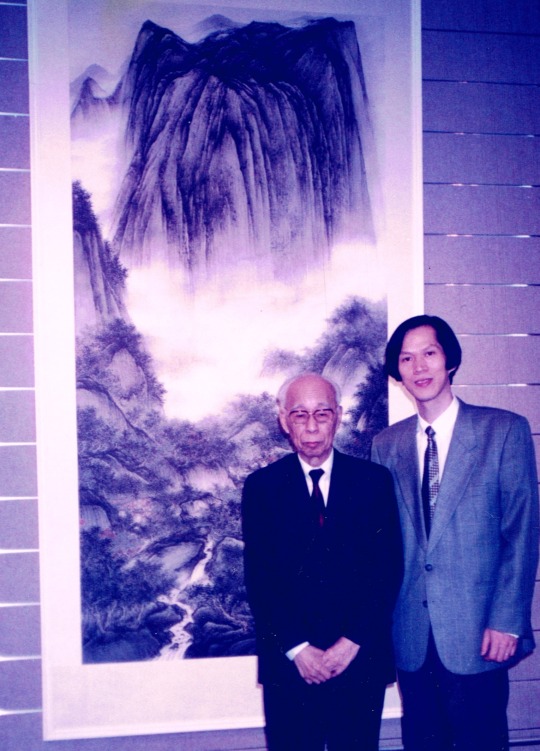
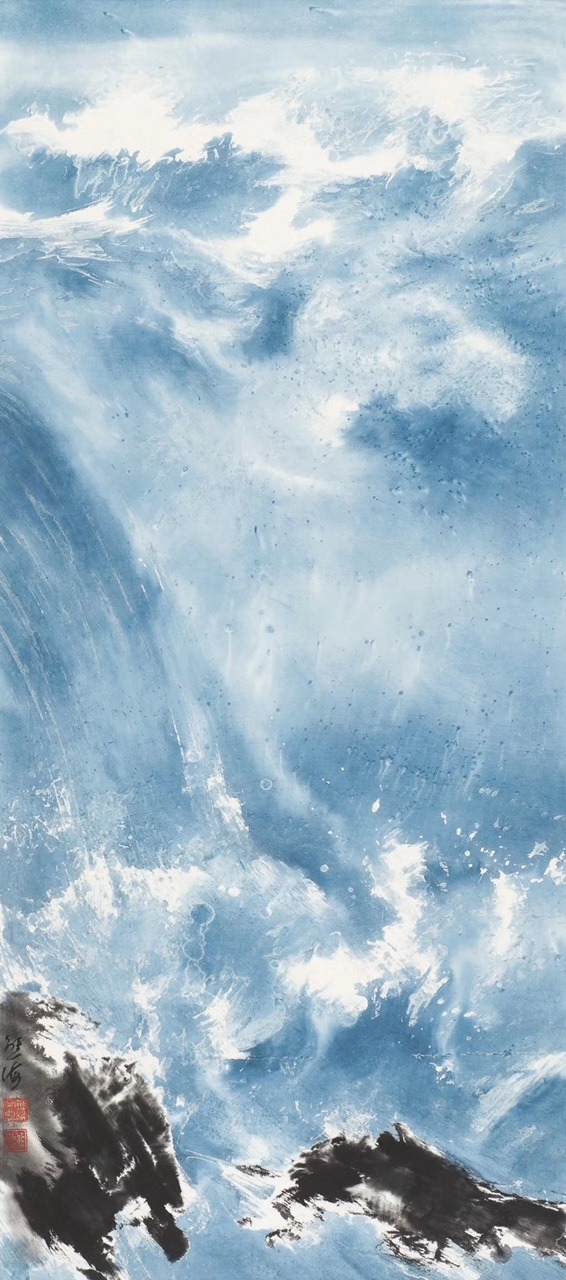
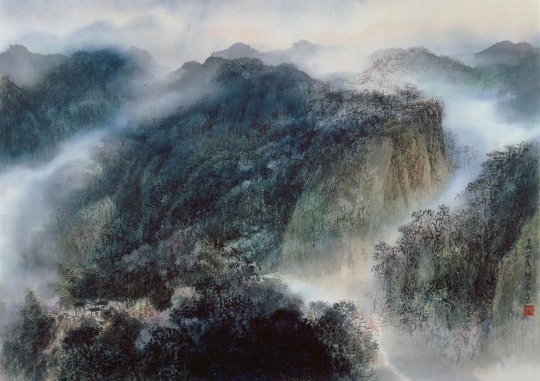
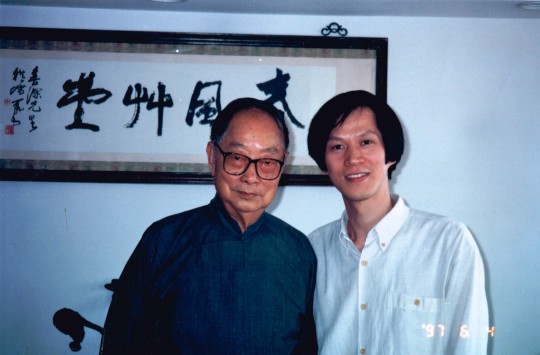
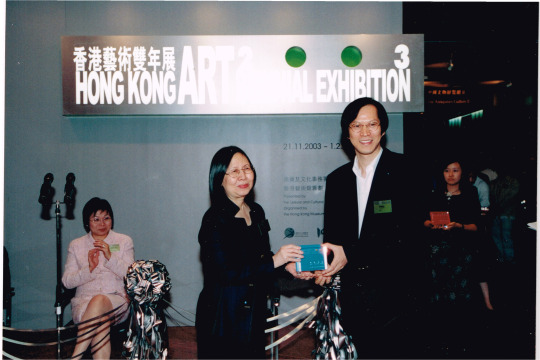
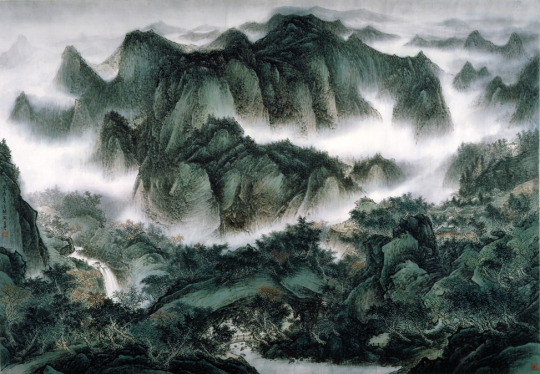
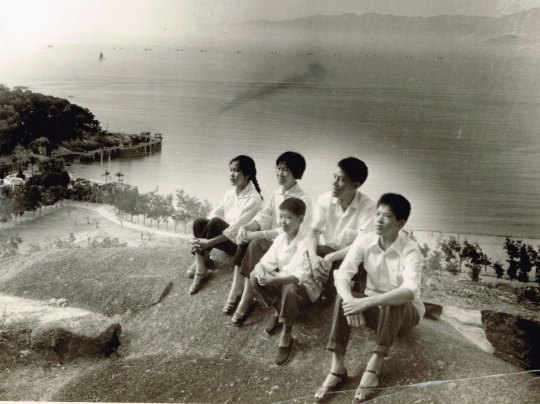
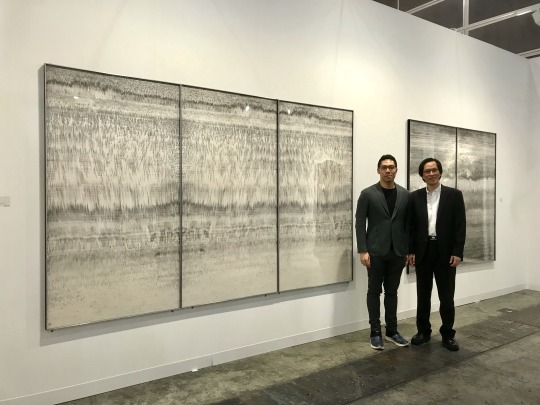
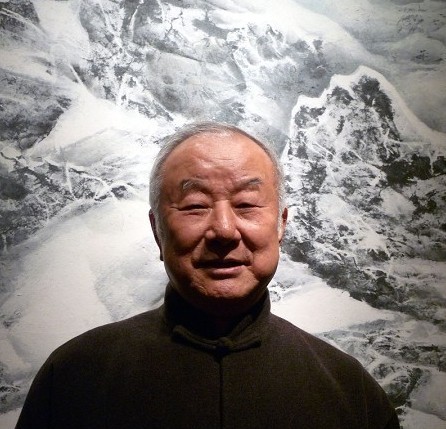
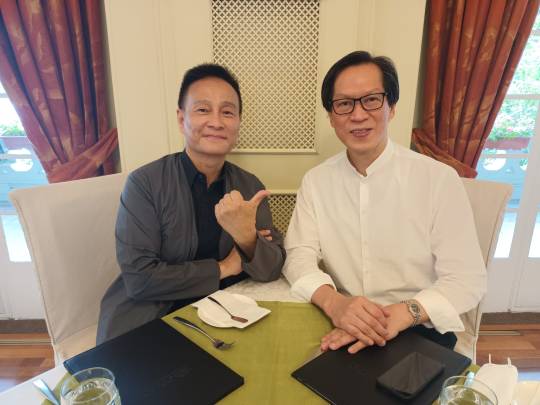
What Is Chinese Ink Painting? Why Are Artist Ink Paintbrushes Soft? What Is The Monumental Success Of ‘New Ink Painting Movement’ In Hong Kong?—Explained By Master Hung Hoi (熊海)
Some people paint what they see. Other people paint what they feel. For the Chinese, painting is a way to express philosophy and literary art such as poems. We see abstract art with our mind, and so perceive what we cannot see physically with our eyes. Abstraction demonstrates an escape route from reality in depicting paradoxically what reality is all about.
Chinese ink painting (水墨畫) is piously about the Nature which can be snow, clouds, mountains, rivers, lakes, trees, flowers, birds or insects. It symbolizes the spiritual and elegant characteristics of Chinese culture. Chinese ink paintbrushes are soft, contrary to the hard brushes in the West. They coincide with the gentle character of the Chinese and can facilitate an abstruse inquiry into philosophical notions loved by the Chinese artists and such notions are usually used to explain things in life. Artists express one-self through these objects without caring about the exact details of reality. It uses traditionally only black ink (later, colour ink is used by some) as an artistic language, together with shapes, lines, forms and symbolic marks to create a beauty in harmony with what is a break-through freedom from the visual constraints of real life. The inseparable spiritual trinity of a Chinese scholar lies in his ink images, poem and calligraphy (書法) appearing on a romantic sheet of silk or rice paper (宣紙).
Master Hung Hoi (熊海) is my favourite ink painter in Hong Kong. I love his willingness to try different styles and readiness to teach us what he has learnt. He shares with me his artistic journey and views.
Master Hung, “The classical style of Chinese ink painting flourished in the Tang Dynasty, more about 1,500 years ago. This artistic tradition in a mixture of water and ink is uniquely Chinese. The painting involves basically the same techniques as calligraphy and is done with a brush dipped in the black ink or colour pigments. Oils are not used. The usual materials on which paintings are made are silk or paper. I love ink painting. Through only black, white and grey, I can however see different colours.”
I asked, “What important role does Hong Kong play in Chinese ink painting?” Master Hung explained patiently, "Since 1842, Hong Kong, being under the British rule, had been a melting pot of people and ideas from all over. The city was a great mix of western and Chinese cultures. The ink painters here in the 60s logically had hesitations to be pleased with only traditional painting styles and concepts. They worked hard and determinedly, despite criticism, to lead a new direction now respectfully known as ‘New Ink Painting Movement’(新水墨運動). Lui Shou-Kwan (呂壽琨) who moved to Hong Kong in 1948 with an empty pocket was a pioneering figure in the movement. His semi- abstract images are metaphorical and very often used to reflect his religious belief.”
Master Hung took a sip of tea, “Great artist Liu Kuo-Sung (劉國松) taught in the Chinese University of Hong Kong in the 1970s. He used the paper-craft of paste and cut to create the visualisation of vivid snow on a painting. Wong Hau-Kwei (黃孝逵) was keen to develop ‘Urban Ink Art’ (都市水墨) which tried to present visual art forms arising from urban areas especially modern architecture. Kan Tai-Keung (靳埭強) incorporated western graphic design ideas into his ink painting. My son Hung Fai (熊輝), also an ink artist, is exploring the use of fountain pen to convey Chinese landscapes.” He chuckled, “After my recent trip to Paris, I started to mix acrylic painting techniques with Chinese ink ways.”
“Could I know your tale?” I asked. Master Hung positively smiled. He said, “My father (熊俊山) was also an ink painter. We lived on Kulangsu (鼓浪嶼) Island which was a place inhabited by artists. He taught me how to paint. As my mother was an Indonesian Chinese, we were able to migrate to Hong Kong for a fresh start in 1978. We lived in extreme poverty and I worked in an antique shop in Quarry Bay as a repairman. Art was the only path to my self-actualization. I kept on learning painting from Master Yang Shan-Shen (楊善深) who died in 2004. There came 3 turning points in my life. In 1981, my artwork was selected into the Contemporary Hong Kong Art Biennial Exhibition. In 1984, The University of Hong Kong offered me a job as a part-time art teacher in their extra-mural studies. In 1991, a famous scholar Hugh Moss agreed to be my art manager and as a result, I became a full-time artist. I loved my teaching post in universities and carried on my job till now. Students inspired me tremendously.”
The works of Master Hung Hoi are exhibited, collected and auctioned internationally. British Museum, the first public national museum in the world, bought his art pieces. He is one of the regular participants in overseas art exhibitions and the frequent ones are in the Chinese Mainland, Taiwan and Japan. He is now the adviser to a number of renowned museums and art organizations.
Master Hung’s gaze went towards the window, “Do not spoil an artist by making him to desire too much. It will hinder his need to work hard and try new things. My life is simple and basic. My goal is to have less materially but to get more spiritually. I am prepared to put myself at risk by attempting more modern concepts and techniques. The journey of ‘New Ink Painting Movement’ began with a group of selfless artists in 1960s and it is never ending. Traditional Chinese art needs progress. Progress is not just about following the past. We have to embrace brave new ideas particularly when we are in Hong Kong where cultural exchanges are super easy. The growth and energy of the Movement counts on the ink painters nowadays not to lose the passion or give up on their dreams, no matter how difficult the journey is. Aim for the sky that we, Hong Kong artists, can reach. Don’t say ‘I give up’! I wish the government of Hong Kong to set up a museum exclusively for the heroes who have taken part in New Ink Painting Movement since 1960s which is significantly a distinctive intangible cultural treasure of Hong Kong.”
While Cantonese Opera or Yueju (粵劇) is the greatest performing-art heritage of Hong Kong, ‘New Ink’ must be equally the greatest visual-art patrimony of our city. I have a dream that one day, the artists here will no longer be judged by the colour of their skin or place of origin, as most people just fancy western art and music, but by the style and quality of one’s work. People in Hong Kong have the ability to be different from other Asians and let us not settle for the ordinary! Hong Kong will remain as the ‘Pearl of the Orient’.
MLee
Chinese Version 中文版: https://www.patreon.com/posts/da-shi-xiong-hai-73245443?utm_medium=clipboard_copy&utm_source=copyLink&utm_campaign=postshare_creator
Master Hung Hoi Chinese Ink Painting Exhibition https://youtu.be/98WOdSopo3w Acknowledgement – onairpower
Hung Fai Chinese Ink Painting Sharing https://youtu.be/DKulsLPTkmk Acknowledgement – 香港視覺藝術中心
History of Hong Kong Modern Chinese Ink Painting https://youtu.be/hyCVWNdEUTc Acknowledgement-輕鬆藝術歷史
Introduction of Master Lui Shou-Kwan by Kan Tai Keung https://youtu.be/VJrfypJr8OQ Acknowledgement – The Culturist
The History of Chinese Ink Painting https://youtu.be/wIpLzItqCqk Acknowledgement – China Cultural Center in Brussels
#Lui Shou-Kwan 呂壽琨#Yang Shan-Shen楊善深#Liu Kuo-Sung 劉國松#Wong Hau-Kwei 黃孝逵#Kan Tai-Keung靳埭強#Hung Fai 熊輝#Hugh Moss#Calligraphy#Rice Paper#Urban Ink Art都市水墨#Kulangsu 鼓浪嶼#British Museum#Yueju 粵劇#The Pearl Of The Orient#Contemporary Hong Kong Art Biennial Exhibition
4 notes
·
View notes
Text
Thinking about how my now-risen-to-heavens immobile&blind&toothless great-great grandma’s only solace before she died was Chinese Opera- and some people still have the audacity to be rude about our culture.
A literal hate comment I saw a while ago on YouTube about Genshin’s Yunjin’s singing, reminded me about how her adoration for Yueju performers might be ridiculed if she was still alive, and now my face is heating up from emotions.
#genshin impact#genshin yunjin#tw rant#tw negative#tw sensitive emotions#tw emotions#tw dead relative#tw death#tw angst#Chinese opera#yueju#粵劇#genshin#Yunjin#Chinese culture
2 notes
·
View notes
Text
Tbh Yunjin’s design is pretty tame considering that there are Yueju masks like this:

#bamboo-zled#粵劇#京劇#Yueju#jingju#Chinese opera#China#Chinese#traditional art#traditions#Chinese traditions#Chinese art#Chinese traditional performance art
4 notes
·
View notes
Photo










The Outstanding Master Loong Koon Tin —— 7 Attractive Secrets Of Yueju Opera in Hong Kong (粵劇)
A man that is stretched too much by a new tech world shall go back to the old definitions of what was a good life.
Yueju opera (Cantonese Opera粵劇) combines traditional Chinese operatic skills and beautiful Cantonese artistic styles. They are beautifully enjoyable. Artists act and sing in Cantonese dialect. The opera has a history of more than 1,000 years and it is popular in the provinces of Guangdong (廣東) and Guangxi (廣西) in the south-eastern region of China. Yueju is characterized by a combination of string and percussion instruments with the emphasis on the latter which controls the tempo of the performance. There are also colourful costumes and symbolic face makeup. Loud music and strong emotions are in parallel. The repertoire is a rich collection of historical romantic epics. In rural communities, Yueju is often part of the religious ceremony which is believed to bring luck into the village and drive ghosts away. Around the world, Yueju is a common cultural bond among the Chinese. Foreigners in different cities are happy to go to their Chinatown to watch the Yueju performance and appreciate the cultural appeal of the opera.
My good friend Loong Koon Tin (龍貫天) is an outstanding and well-liked Yueju artist in Hong Kong. He is tall, burly, intelligent and helpful. In the 70s, his loving mother took great care of a family of 3 kids by working in a printing factory when the father of Loong passed away at his age of 14. Loong fell in love with Yueju whilst he was a student. With the need to bring home the bacon, Loong worked in a bank after finishing high school and declined the chance of studying abroad. ‘Be a voice, not an echo’ was a drive to get him finally determined to be a performer on stage and not just an audience. He joined training classes and served as an apprentice to great Yueju masters. In 1986, Loong quit his banking career. He said, “With my resignation, I felt fulfilled because the art career in front of me will be my true strength and passion.”
I asked Loong why Yueju is interesting. He put it simply, “Yueju crosses a number of art genres. A performer covers a wide range of skills: singing(唱), acting(做), dialoguing and rapping(唸), acrobatics(打) and dancing(舞). Yueju is a talent show and may be compared to a musical. It is never boring. Young people may not like it because the gulf between Yueju and the kind of modern music they are used to has become too wide. Since Yueju is the cultural treasure of Hong Kong, young people should learn to accept and love it.”
Loong paused, “The next beauty is the vast collection of Yueju’s literature including stories, poems, novels and folklore, opening up a world’s inspiration and creativity while also developing your literacy skills which are essential for an educated person.” I agreed, “The vocabulary that I learnt from Yueju improves my listening, speaking, reading and writing. Our traditional but useful Chinese vocabulary is often forgotten.”
Loong highlighted the attractiveness of Yueju music, “Yueju places emphasis on percussion instruments such as drums, gongs and bells. They keep the lively rhythm of Yueju songs and make it blend well all other instruments together, creating one cohesive loud sound of Yueju music which is the special feature of the art form.”
Be that as it may, to love Yueju is to experience its pangs or raptures. Loong said, “Yueju opera is full of love which is expansively romantic in terms of music and stories. The story grammar is usually about 2 characters, a handsome man and a pretty lady, meeting in a fairy-tale place but at the wrong time. They kick off the opera with love and after many difficult events, end up with love again.” I laughed, “The whole purpose behind watching a Yueju opera for many, including myself, is to seek dreams, dreams of love!”
Loong went further to discuss, “Yueju can also teach positive values. Our stories are mostly decent and moral. The frontiers closed off to our plot is that bad people must be punished and good people will be rewarded. The good message of Yueju stays with the audience and such message will transform and humanize a person.” I agreed, “My grandparents were not well-educated but generation after generation, they shared with us the Yueju moral stories with valuable lessons.”
He drank off his wujiapi wine and said, “Yueju is modern and accommodatingly improvisational and some thought its spirit can be close to jazz, very free. In Yueju opera, actors and musicians all know the tunes, scripts and dramatic needs extremely well. When the performance goes on, they will create improvised variations for oneself or others, depending on the audience’s reaction. Surprisingly, all can co-ordinate and act in concert with the teammates very well. Other traditional Chinese operas do not use western musical instruments. Yueju is however flexible. Violin, guitar, saxophone and banjo etc. are used.” I was excited, “Yes, Yueju music is a fascinating fusion!”
Loong made his last comment, “The stage makeup and costumes of Yueju are also fascinating. We use bright and colourful pearl slices, jinyinsi lines, crystal ornaments, silk fabrics, bead decorations and sequins on our clothing. Makeups are also full of different colours and combinations. They are symbolic and each design carries a hidden moral implication of the character in question. That is a lot to learn, explore and enjoy!”
Master Loong Koon Tin is a convincing expert having an abundance of the specialized knowledge about Yueju opera. He acquired the old skills of the art form but will improve it to attract more young audience.
Yueju, as an ancient art, is never going to be very mainstream but it takes in the rich mythology, and wisdom of our artists, passed from one generation to the next. The understanding and acceptance of different art forms is a crucial step for you to break the gap between yourself and the world outside Hong Kong.
MLee
中文版 Chinese Version: https://www.patreon.com/posts/shuo-ai-xiang-de-53975398?utm_medium=clipboard_copy&utm_source=copy_to_clipboard&utm_campaign=postshare
Loong Koon Tin: Trump on Show Acknowledgement – Edward Li https://youtu.be/3KOQNxcCyRs
Loong Koon Tin Interview Acknowledgement – kim kim https://youtu.be/5hD25GWHwiQ
Loong Koon Tin Cantonese Opera (Yueju) Acknowledgement – pineapple1881 https://youtu.be/DsUE2m_uSRE
The 12 Hairpins and the 12 Balustrades (Yueju Dance) Acknowledgement-忘了!忘不了 https://youtu.be/8bwl7348HEA
Fragrant Sacrifice (the most famous Yueju song) Acknowledgement – Canaan Optical https://youtu.be/5rgNRdbPdtg
Japanese Noh Acknowledgement-Japan Culture Expo https://youtu.be/yxL2aESjdX4
Children Cantonese Opera (Children Yueju) Acknowledgement – Percy Lo https://youtu.be/5lJL5baJHXc
#Loong Koon Tin 龍貫天#Yueju Opera 粵劇#Gongs#Percussion Instrument#Folklore#Wujiapi Wine#Be A Voice Not An Echo#Bring Home The Bacon
0 notes
Photo










The 94-year-old Yueju Music Master Choo Heng-cheong: Hong Kong & Yueju Are Just The Same—Great People Should Move Beautifully Together To Accommodate Each Other
I live in the past. I do not live in the present. My future is not yet with me.
Hong Kong has become too modern, fast and brutal. I enjoy watching the old films of Hong Kong made in the 1950s. Our city was visually romantic and emotionally delicate. The profound beauties of life’s simple fundamentals moved me. People were modest and aspiring, and so were the movies.
My grandparents, parents and elderly relatives had gone. I do not know any friend being born in the 1920s except two: Sister Peggy (林貝聿嘉) who is still a righteous feminist and music master Choo Heng-cheong(朱慶祥) whose year of birth is 1927 and was just awarded an honorary doctorate by Hong Kong Academy for Performing Arts for his colossal amount of contributions to Yueju(Cantonese Opera) (粵劇) in Hong Kong.
Master Choo, despite his age, is youthful, witty, helpful and energetic. He said, “I am truly on my own. People around my age have all left me. My two great elder brothers who were also Yueju musicians passed away as early as in 1980s. I am not lonely. The days of my years are still beautiful. There are things in life which are invisible to the eye but they are discovered only by your heart. A senior should, before all else, exercise to prevent illness and also be thankful and happy. I exercise in Victoria Park at 4:30 a.m. every day. My father and uncle were both players in the musical ‘band’ of Yueju. They left China for Malaysia around 1920 and made a living as musicians in Ipoh theatre areas. I was born in the Old Town of this tin-mining Chinese city which was back to the late 19th century. I worked as an actor trainee when I was a little boy. The income instability soon forced me to be a musician who could easily get a well-paid job. I learnt to play western and Chinese music instruments. It was my dream to work in Hong Kong in those days. The city was vibrant, like the West End or Broadway in Asia. Malaysia prohibited men from leaving the country until they reached the age of 30 at that time. In 1959, when I was 32, I came to Hong Kong. The role of a ‘music director’ became my career and Hong Kong became my home.”
I asked, “Time slips away. Can you tell me the glory days of Yueju in the 50s?” Master Choo let memories walk through his mind, “Alas, the good old days never return. In the 50s, a theatre catering for two purposes, as a movie cinema and Yueju opera house, existed in almost every district of Hong Kong. There should be more than 20 at that time. The Yueju troupes performed on a regular basis in nice theatres. In the events of Chinese festival celebrations and temple consecrations, performances will be moved to open spaces and temporary bamboo theatres. Some backstage workers were so busy that they could not go home. They simply slept in the theatres. I was busy playing music.”
Master Choo immersed himself in the sweet memories, “In the 50s and 60s, a Cantonese opera ticket price was 8 to 9 Hong Kong dollars but a worker just earned 100 dollars a month. The ticket was one tenth of his salary. People loved Yueju so much that they did not mind spoiling themselves on such expensive but enjoyable shows. I remember the most popular artist Yam Kim Fai(任劍輝) once charged 50 dollars per ticket in the 60s.”
He sighed with dismay, “Now, Yueju is considered being over the hill as an art or entertainment. The art groups are doing their best to save the industry. The situation is really sad. In the past, an opera repertoire could last for many months but nowadays, even a good performance could survive for only one to two days. Yueju used to be for all ages. Today, most audience are senior persons. There is a vicious circle linking the poorer standard with poorer income of the performers ironically. We should turn newcomers to our field to become part of the solution, not just the problem, by giving them high-quality training. Many musicians and singers are technically fit. They simply cannot beat out a classical Yueju rhythm and charm on their music.”
Master Choo continued, “The past glories of Yueju are worth revisiting. In the 40s, 50s and 60s, Hong Kong opera groups were invited to perform in Macau, Chinese Mainland, Southeast Asia, Canada, American, Mexico, Cuba, Australia, New Zealand and Europe, wherever there were Chinese or China Towns. World touring was a difficult job. We rarely saw anything. We arrived in a foreign city, did the show and were gone. Such touring was critical to our earnings. I remember I was the first one in the trade to demand a ‘written contract’ for the protection of musicians. I was paid US$50 per day. To be frank, most Yueju workers were not educated but we made good money because of the booming Cantonese opera industry. After working hard for a few years, I bought my first apartment in Mong Kok and the price was only HK$38,500! Inflation is a terrible thing and without asset, too much money in the system would somehow make you poor!”
I asked Master Choo, “You must have many hard times in life for your past 94 years. How could you let yourself not be defeated?” He looked at me with pride, “Cantonese opera is a very special form of Chinese classical art. It is analogous to jazz in the western music. Within a certain frame of rules, actors and musicians spontaneously but wisely change their performances in order to adapt to each other so as to produce the best improvised show in the mood of the audience. All players knew how to interact instantly. Singing, acting, acrobatic feats and music accompaniment parts responded to each other creatively, harmoniously and beautifully. Hong Kong experienced too many social conflicts in the recent years. I genuinely wish that people in Hong Kong would learn, like what we are doing in Yueju, to think and move beautifully in matching harmony with other people. Reasonable accommodation for your teammate at the price of sacrificing your own wants and views is an inevitable part of compromise in life. We must acquire the quality of respect, both for yourself and others.”
I salute Master Choo by this: “getting old is like climbing a mountain; and you get a little out of breath, but the view of a senior fellow is much better!”
MLee
Chinese Version 中文版: https://www.patreon.com/posts/94sui-xiang-gang-60205747?utm_medium=clipboard_copy&utm_source=copy_to_clipboard&utm_campaign=postshare
Yueju Music Talk by Choo Heng Cheong https://youtu.be/WB05kI4ssCw Acknowledgement – Michael Fung
Choo Heng Cheong Interview https://youtu.be/g8-E8oo2en8 Acknowledgement-明周
Famous Yueju actor - Sun Ma Sze Tsang https://youtu.be/18AGStg08ig Acknowledgement-J Fung
Famous Yueju actors – Pak Suen Sin and Yam Kim Fai https://youtu.be/Gdz9FuUPyPk Acknowledgement – Tony Wong
Famous Yueju actor – Leung Sing Bor https://youtu.be/Zav4YiPZK-0 Acknowledgement-tamdiksuen
Nanyin Music by Yuen Siu Fai https://youtu.be/oJvwUMDObrw Acknowledgement – Michael Fung
Old Cinemas/Theatres in Hong Kong many years ago https://youtu.be/SJXWVfuQHJw Acknowledgement-紅麈網事
#Choo Heng-cheong朱慶祥#Peggy Lam林貝聿嘉#Yam Kim Fai任劍輝#Cantonese Opera#Yueju#HKAPA#West End#Broadway#Bamboo Theatre#Tin Mining#Temple Consecration#Ipoh#Old Town#Vicious Circle
1 note
·
View note